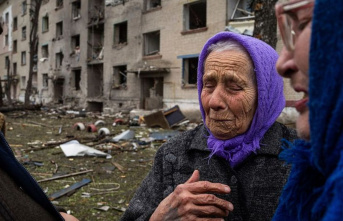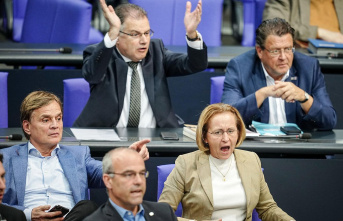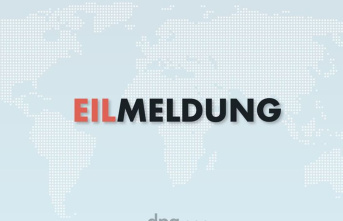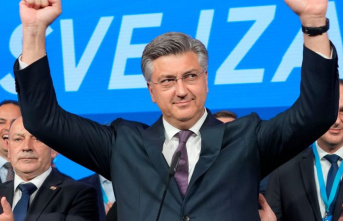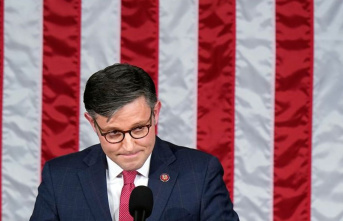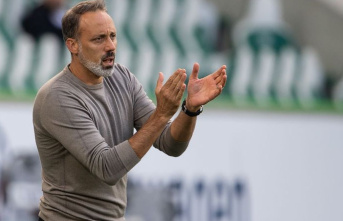Human rights champions in Belarus, Russia and Ukraine will receive the Nobel Peace Prize this year. The world's most prestigious peace prize goes to the imprisoned Belarusian human rights lawyer Ales Byaljazki, the Russian organization Memorial and the Ukrainian Center for Civil Liberties. This was announced by the Norwegian Nobel Committee on Friday in Oslo.
This year's award winners represented civil society in their home countries, said committee chair Berit Reiss-Andersen at the awards ceremony. For many years they have campaigned to protect the fundamental rights of citizens and the right to criticize those in power.
The announcement coincided with Russian President Vladimir Putin's 70th birthday on Friday. When asked about this, Reiss-Andersen said: "This award is not for President Putin, not for his birthday or in any other sense - except that his government, like the government in Belarus, represents an authoritarian government that represses human rights defenders." The attention that Putin has attracted and that is relevant in this context is the way in which civil society and human rights activists are being suppressed. "That's what we want to address with this award. We always give an award for something and to someone - not against someone."
Reiss-Andersen stressed that they are particularly concerned about Byalyatski, who is being held in prison under very harsh conditions. "We pray that this award will not affect him negatively, but we hope that it will boost his morale."
Byalyatski, who has been in a Belarusian prison for more than a year, has been fighting for democracy and freedom in his home country for many years. The 60-year-old and the human rights center Wesna, which he founded, achieved great international fame in the course of the mass protests after the presidential election in summer 2020, which was classified as fraudulent.
Hundreds of thousands of Belarusians took to the streets against long-time ruler Alexander Lukashenko, who was criticized as "Europe's last dictator". Tens of thousands were temporarily arrested, hundreds injured and several killed. Byalyatski had already received the Right Livelihood Award in 2020, which is commonly referred to as the Alternative Nobel Prize.
Belarusian opposition leader Svetlana Tichanovskaya congratulated her compatriot. "This is great news! Ales Byalyatsky is the pride of Belarusians. Now it's known all over the world," Tikhanovskaya wrote on her Telegram channel on Friday. She also published a photo showing the two together.
Memorial dissolved last year
The internationally renowned Russian human rights organization Memorial was dissolved last year on orders from the authorities for allegedly violating the law. She campaigned for the politically persecuted and prisoners. And she clarified the crimes of the communist dictatorship in the Soviet Union. However, many projects are continued even after the dissolution.
The company, which was founded in the late 1980s, complained at the beginning of the dissolution proceedings that the goal was "the destruction of an organization that deals with the history of political repression and the protection of human rights". Human rights activists have been complaining about increasing authoritarian tendencies and the persecution of dissidents in Russia for a long time.
Memorial co-founder Svetlana Gannushkina was "overjoyed". "What? Memorial? Our memorial? Like that, it's resolved," said the 80-year-old. "This is a great recognition for those people in Russia who do not support this terrible war against our neighbor Ukraine. It is not the case that the Russians are for the war, as is often portrayed. Many are ashamed of their country," said the human rights activist who was also mentioned by name by the Nobel Committee.
That's what the Center for Civil Liberties does
The Center for Civil Liberties, founded in 2007, has been drawing attention to the situation of Ukrainian prisoners since the beginning of the war and calling for their release. Even before the Russian troops marched in at the end of February, civil rights activists had been documenting human rights violations on the Black Sea peninsula of Crimea, annexed in 2014, and in other occupied areas. The centre, which sets itself the goal of promoting democracy and human rights, also regularly denounces human rights violations in neighboring Belarus.
The Stockholm peace research institute Sipri expressed its full praise for the selection. "I think the committee is sending the message that human rights, civil liberties and an active civil society are parts of peace. I don't think you can argue with that," said Sipri director Dan Smith. Germany's Foreign Minister Annalena Baerbock wrote on Twitter that the award honors "all those who fight for their rights and freedom with enormous courage and at great risk." Deputy government spokesman Wolfgang Büchner also paid tribute to the three award winners. They were active against the repression and crackdown on peaceful civil society forces.
With that, the days of Nobel Prize announcements have reached their peak. The winners in the categories medicine, physics, chemistry and literature had already been announced this week. Next Monday, the Nobel Prize for Economic Sciences will follow, which is the only one of the prizes that does not go back to the testament of Alfred Nobel (1833-1896), inventor of the dynamite and founder of the prize.
980,000 euros for the winners
This year, the Nobel Prizes are again endowed with ten million Swedish crowns (around 980,000 euros) per category. They are traditionally awarded on the anniversary of Nobel's death, December 10th. The Nobel Peace Prize is the only one of the prizes that is not presented in Stockholm, Sweden, but in the Norwegian capital, Oslo.
The Nobel Peace Prize is considered the most important peace prize on earth. A total of 343 candidates - 251 personalities and 92 organizations - were nominated for him this year. The names of the nominees are traditionally kept secret for 50 years. Last year, the Filipino Maria Ressa and the Russian Dmitri Muratow were honored with the prize. The two journalists received it for their fight for freedom of expression.


